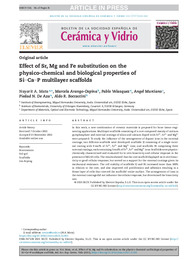Please use this identifier to cite or link to this item:
https://hdl.handle.net/11000/30833Full metadata record
| DC Field | Value | Language |
|---|---|---|
| dc.contributor.author | Mata, Nayarit A. | - |
| dc.contributor.author | Arango-Ospina, Marcela | - |
| dc.contributor.author | Velasquez, Pablo | - |
| dc.contributor.author | Murciano, Angel | - |
| dc.contributor.author | De Aza, Piedad | - |
| dc.contributor.author | Boccacciniba, Aldo R. | - |
| dc.contributor.other | Departamentos de la UMH::Ciencia de Materiales, Óptica y Tecnología Electrónica | es_ES |
| dc.date.accessioned | 2024-01-30T11:41:01Z | - |
| dc.date.available | 2024-01-30T11:41:01Z | - |
| dc.date.created | 2021-11 | - |
| dc.identifier.citation | Boletín de la Sociedad Española de Cerámica y Vidrio (2021) | es_ES |
| dc.identifier.issn | 0366-3175 | - |
| dc.identifier.uri | https://hdl.handle.net/11000/30833 | - |
| dc.description.abstract | tIn this work, a new combination of ceramic materials is proposed for bone tissue engi-neering applications. Multilayer scaffolds consisting of a core composed mainly of calciumpyrophosphate and external coatings of silica and calcium doped with Fe3+, Sr2+and Mg2+were prepared. To study the influence of the arrangement of dopant ions in the externalcoatings, two different scaffolds were developed: scaffolds 3J consisting of a single exter-nal coating with 9 mol% of Fe3+, Sr2+and Mg2+ions; and scaffolds 3S comprising threeexternal coatings, each containing 3 mol% of Fe3+, Sr2+and Mg2+ions. Scaffolds were physico-chemically characterized and evaluated for in vitro bioactivity and cellular response in thepresence of MG-63 cells. The results showed that the core scaffold displayed no in vitro bioac-tivity or good cellular response, but served as a support for the external coatings given itsmechanical resistance. The cell viability of scaffolds 3J and 3S increased more than 100%in relation to the core, and also improved cell proliferation and adhesion resulting in adense layer of cells that covered the scaffolds’ entire surface. The arrangement of ions inthe external coatings did not influence the cellular response, but determined the bioactivityrate. | es_ES |
| dc.format | application/pdf | es_ES |
| dc.format.extent | 15 | es_ES |
| dc.language.iso | eng | es_ES |
| dc.publisher | Elsevier | es_ES |
| dc.rights | info:eu-repo/semantics/openAccess | es_ES |
| dc.rights | Attribution-NonCommercial-NoDerivatives 4.0 Internacional | * |
| dc.rights.uri | http://creativecommons.org/licenses/by-nc-nd/4.0/ | * |
| dc.subject | Bioceramics | es_ES |
| dc.subject | gelScaffoldsIon | es_ES |
| dc.subject | dopinga | es_ES |
| dc.subject | Sol–gel | es_ES |
| dc.subject.other | CDU::6 - Ciencias aplicadas::60 - Cuestiones generales de las ciencias aplicadas | es_ES |
| dc.title | Effect of Sr, Mg and Fe substitution on thephysico-chemical and biological properties ofSi Ca P multilayer scaffolds | es_ES |
| dc.type | info:eu-repo/semantics/article | es_ES |
| dc.relation.publisherversion | https://doi.org/10.1016/j.bsecv.2021.11.005 | es_ES |

View/Open:
BSECV SrMgFe Nayarit.pdf
6,43 MB
Adobe PDF
Share:
.png)
